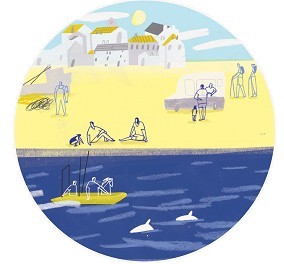This new research report from the New Economics Foundation (NEF) is a refreshing look at our coastal communities and their economies.
It provides proposals for action, which are leavened through a recognition of history and localised specialist skills. The analysis is elevated beyond the ordinary ‘top down research’ by emphasising the need for socio-political and economic frameworks in coastal communities which re-connect people with nature and the coastal landscape – a series of contours that are geographical, industrial and philosophical.
The report takes us out of the ivory tower and into the sand dunes.

![]() You can view, print or download a pdf copy of this NEF report here…
You can view, print or download a pdf copy of this NEF report here…
Previous NEF research has already looked at how a low-carbon economy can generate new jobs and economic entities, that can offer secure, decently paid and satisfying work in a more equally distributed economic landscape. See more here…
The essence of the New Blue Deal is to build on existing initiatives and create a mixed framework of five changes and economic thematic deliveries, which are sustainable, inviting and inclusive to the communities of focus.
- sustainable fisheries and aquaculture
- renewable energy
- coastal tourism and related activities
- innovative approaches to coastal management
- opportunities to re-connect people with nature
‘For the fishing industry, for example, NEF analysis shows that restoring UK fish stocks to healthy levels and promoting lower carbon emissions through
quota allocation across the main UK fishing fleets would mean an extra 457,000 tonnes of fish landed each year, leading to an additional £268 million
GVA (Gross Value Added) and a 24% increase in employment, the equivalent of 4,922 new jobs’.
Source: Carpenter, G., Esteban, A. (2015) Managing EU fisheries in the public interest: Results from the Bio-Economic Model of European Fleets. New Economics Foundation. Results calculated using 2010-2012 performance. New jobs estimate is made up of fishing jobs (11%) andprocessing jobs (89%). Retrieved from: http://www.fisheriesmodel.eu/
The report looks at a variety of UK locations, with fishing being a key focus of course. However, other work is highlighted. Engagement and partnerships that work across responsible tourism, leisure and recreation.
From Anglesey Adventures, a business working in the outdoor leisure arena, to The Venus Company, working in its chain of cafes to ‘…balance customer needs with environmental and social considerations’. We particularly liked the feature on Learn to Sea, a ‘sea school’ project in South Devon. Using the coastal spaces as an educational resource which informs children and young people, but which also carries forward the ideas of sustainability, economic durability and environmental awareness into the next generation.
Here at conversationsEAST we are incredibly fond of the Suffolk coastline, for example. But we look at areas around communities like Great Yarmouth or Lowestoft, with their long tradition of fishing and livelihoods from the sea. Whilst we recognise that ‘Big Oil’ does provide jobs and technical advancement for some sectors of the community, without doubt, creating a recognisable influx of highly specialised employees from external sources.
Whilst this fosters economic activity which is vital, it does not reposition those communities to explore, create and sustain their history with their coastline and enable them to encourage the growth of entry level and intermediate skilled work.
The New Blue Deal does.
You do not need to spend long with the NEF document to see, in your mind, how your favourite stretch of coast can become a thriving community – a nexus of education, social and community enterprise, ocean facing and non-exploitative at every level.
We commend this report to our readers. If you would like to explore and track the New Blue Deal there is a new NEF website available here. http://www.bluenewdeal.org/
